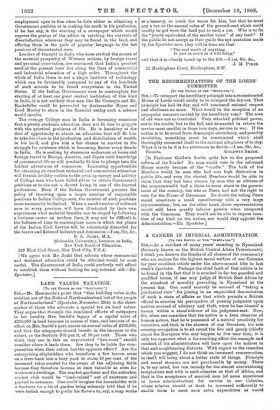A CANKER IN IMPERIAL ADMINISTRATION. [TO THE ZOITOR OF THE
" sesorwroto] Sin,—As a resident of many years' standing in Nyasaland (formerly known as the British Central Africa Protectorate), I think you deserve the thanks of all classes of the community who are zealous for the highest moral welfare of our Colonies for your excellent article under the above-named title in last week's Spectator. Perhaps the chief fault of that article is to be found in the fact that it is couched in far too guarded and qualified terms, if one may judge of British East Africa by the standard of morality prevailing in Nyasaland at the present day. One could scarcely be accused of "taking a puritanical view" for joining in an unqualified denunciation of such a state of affairs as that which permits a British official to exercise his prerogative of passing judgment upon natives accused of adultery and theft, when he has himself a harem within a stone's-throw of his judgment-seat. Now, Sir, when one considers that the native is a keen observer of human nature, that he is possessed of a natural proclivity for imitation, and that, in the absence of any literature, his sole evening occupation is to sit round the fire and gossip (chiefly about the European who may happen to live near him), it is only too apparent what a far-reaching effect the example and conduct of his administrators will have upon the natives in that and neighbouring districts. With regard to the remedies which you suggest, I do not think an increased remuneration, in itself, will bring about a better state of things. Principle and moral stamina are not purchasable by money. There is, to my mind, but one remedy for the almost overwhelming temptations met with in such climates as that of Africa, and that is the acceptance of married -men (of some experience in home administration) for service in our Colonies, whose salaries should at least be increased sufficiently to enable them to meet such extra expenditure as would
necessarily be incurred by the change. Under the new regime there would be at once a decided, and, I believe, permanent, improvement in the moral of our administration, to say nothing of the general health and well-being of the parties concerned. As regards the increased drain on the Treasury mentioned above, why do all Government officials require to come home from the East Coast of Africa every two years when all other members of the community (who are working at least as strenuously) remain in the country for a period of four years, or even more ? A change in this respect would far outweigh the extra salaries paid to the official. But what- ever the remedies decided upon, one thing is clear,—Britons at home must not allow themselves to rest content with the thought that the "open sore" so much lamented by Living- stone has been permanently healed when it has, in fact, broken out in a more virulent and malignant manner in the form of a different, but far more insidious, slavery. The Colony is young yet, and we must be careful not to expect too much ; but if things are allowed to go on from bad to worse—or even to remain as they are—we must remember that a foundation of peace cannot long rest upon such an insecure basis as the fear and dread of a bullying native soldiery, coupled with the negative quality of a strict surveillance as to the possession of firearms by the native population. Unless we can command that respect for the white man which is based on the principles of righteousness, justice, and equity, it were far better—as you say in effect—that we should withdraw from the field altogether rather than mar our so-called colonisation with the taint of a corresponding corruption.—I am, Sir, &c., ONE WHO KNOWS.















































 Previous page
Previous page